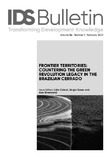Transformations of the Agricultural Frontier in Matopiba: From State Planning to the Financialisation of Land
| dc.contributor.author | Boechat, Cassio | |
| dc.contributor.author | Pitta, Fábio | |
| dc.contributor.author | Pereira, Lorena Izá | |
| dc.contributor.author | Toledo, Carlos De Almeida | |
| dc.coverage.spatial | Brazil | en |
| dc.date.accessioned | 2023-02-01T16:12:08Z | |
| dc.date.available | 2023-02-01T16:12:08Z | |
| dc.date.issued | 2023-02-06 | |
| dc.identifier.citation | Boechat, C.A.; Pitta, F.T.; Pereira, L.I. and Toledo, C.A. (2023) 'Transformations of the Agricultural Frontier in Matopiba: From State Planning to the Financialisation of Land', IDS Bulletin 54.1: 17–32, DOI: 10.19088/1968-2023.103 | en |
| dc.identifier.issn | 1759-5436 | |
| dc.identifier.uri | https://opendocs.ids.ac.uk/opendocs/handle/20.500.12413/17856 | |
| dc.description.abstract | This article explores how the agricultural frontier in Brazil is conceived and how it has been historically shaped by broader socioeconomic changes. It considers the planning process linked to the Cerrado occupation during the military dictatorship (1964–85). The article analyses understandings of the frontier that connected it to concerns about ‘demographic gaps’ and shaped an agenda of state-led ‘national integration’ that neglected local populations. This analysis is linked to recent transnational real estate activities in Matopiba to document how control over the territory persists but is now driven by different protagonists and logics. We document how Brazilian agribusinesses, in association with transnational capital, have created transnational agricultural real estate companies and acquired land in frontier areas such as Matopiba. Although the violence of expropriation and deforestation persists, there are new financial mechanisms that condition the agricultural frontier and exert control over territory, quite unlike previous forms of state-led occupation. | en |
| dc.description.sponsorship | Newton Fund Researcher Links Workshops grant, ID 2019-RLWK11-10177 | en |
| dc.description.sponsorship | UK Department for Business, Energy and Industrial Strategy | en |
| dc.description.sponsorship | Fundação de Apoio a Pesquisa do Distrito Federal (FAPDF), Brazil | en |
| dc.description.sponsorship | British Council | en |
| dc.description.sponsorship | UK Economic and Social Research Council, ID ES/R00658X/1 | en |
| dc.language.iso | en | en |
| dc.publisher | Institute of Development Studies | en |
| dc.relation.ispartofseries | IDS Bulletin;54.1 | |
| dc.rights | This is an Open Access article distributed under the terms of the Creative Commons Attribution 4.0 International licence (CC BY), which permits unrestricted use, distribution, and reproduction in any medium, provided the original authors and source are credited and any modifications or adaptations are indicated. http://creativecommons.org/licenses/by/4.0/legalcode | en |
| dc.rights.uri | http://creativecommons.org/licenses/by/4.0/ | en |
| dc.subject | Agriculture | en |
| dc.subject | Environment | en |
| dc.subject | Finance | en |
| dc.subject | Politics and Power | en |
| dc.subject | Security and Conflict | en |
| dc.subject | Trade | en |
| dc.title | Transformations of the Agricultural Frontier in Matopiba: From State Planning to the Financialisation of Land | en |
| dc.type | Article | en |
| dc.rights.holder | Institute of Development Studies | en |
| dc.identifier.team | Rural Futures | en |
| dc.identifier.doi | 10.19088/1968-2023.103 | |
| dcterms.dateAccepted | 2023-02-06 | |
| rioxxterms.funder | Default funder | en |
| rioxxterms.version | VoR | en |
| rioxxterms.versionofrecord | 10.19088/1968-2023.103 | en |
Files in this item
This item appears in the following Collection(s)
Except where otherwise noted, this item's license is described as This is an Open Access article distributed under the terms of the Creative Commons Attribution 4.0 International licence (CC BY), which permits unrestricted use, distribution, and reproduction in any medium, provided the original authors and source are credited and any modifications or adaptations are indicated. http://creativecommons.org/licenses/by/4.0/legalcode


